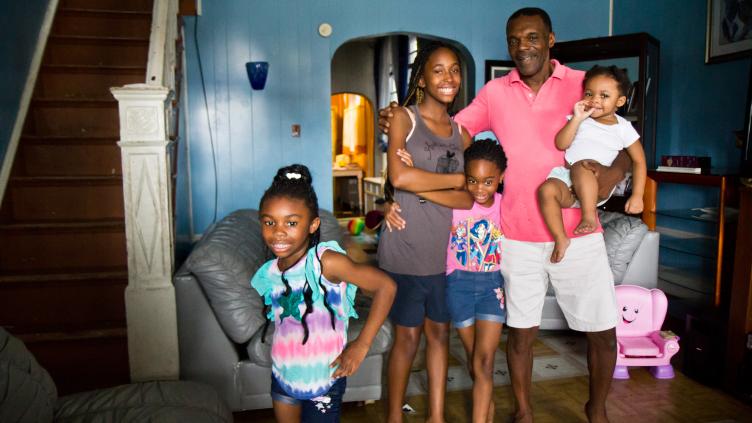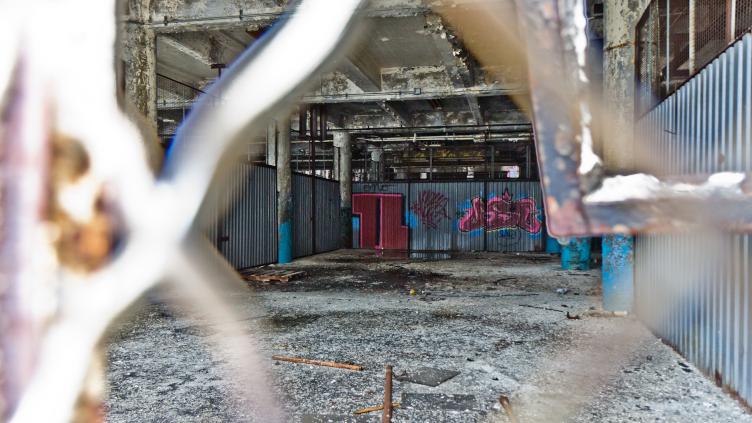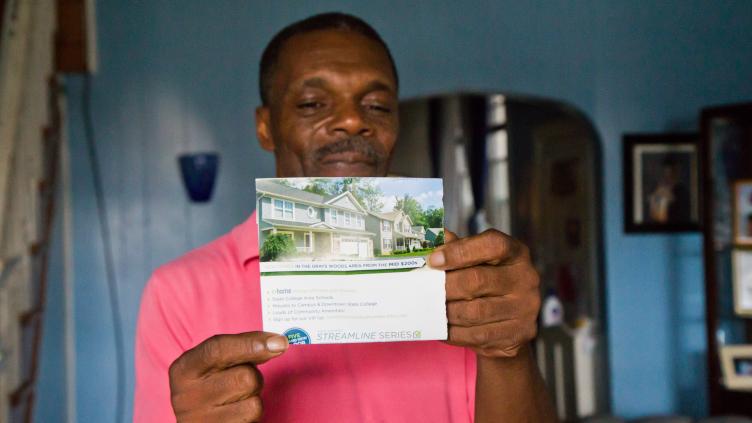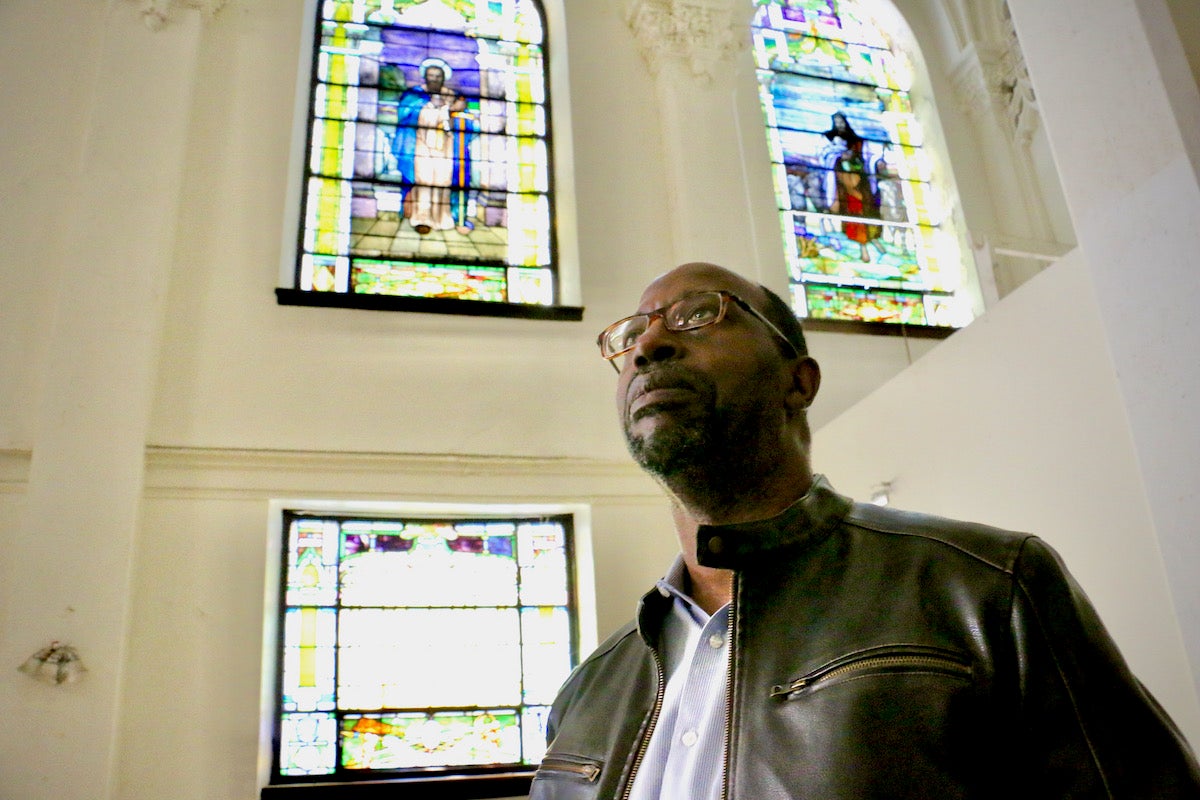A Nicetown factory goes to auction
“It was the heartbeat of this neighborhood.”
This article originally appeared on PlanPhilly.
—
When O’Dell Brown first moved to Nicetown, 42-years ago, there was no escaping the Budd Manufacturing Company. The car, airplane, and rail parts factory looms just across the street from Brown’s two-story rowhome, its campus larger than the entire town of Millbourne, PA.
Built over decades to fabricate massive goods, the booming assembly line once echoed all day and all night, stamping out airplane bodies or rail cars for the city’s Market Frankford Line.
It ran every day. And every night. Budd soundproofed around 1980, but Brown, a pastor at New Birth Deliverance Church, says the noise never bothered him. It was the sound of industry. It was the sound of money being made by Budd’s thousands of union employees, many of whom lived in Nicetown.
“It was the heartbeat of this neighborhood,” he says today, of the factory.
But that heart stopped beating in 2003, when Budd ceased operations at its Hunting Park Avenue plant, some 91 years after the company’s foundation. Today, the shattered complex is largely abandoned, a husk passed from one speculator to another. About half of the old campus will go up for auction on Oct. 4. The for-sale site covers 26 acres of land, five parcels, and six gigantic former Budd Co. buildings. The largest is nearly 700,000 square feet.
In truth, this was more than just the heart of Nicetown. Budd, which filed for bankruptcy in 2014, employed a workforce of some 2,400 people at its Philadelphia plants in the 1980s. And, nearby, once rumbled other erstwhile powerhouses like Tasty Baking, Atwater-Kent, Philco, Midvale Steel, and the American Pulley Company, employing thousands more.

In this industrial promise land, Budd Co., with its sprawling campus, was far and away the biggest player. With its demise have come similar fates for other companies too, and many neighboring factory buildings have wrestled with abandonment.
But many have also recently come back to life. Tasty Baking’s old property was reimagined as a strip mall and storage facility called Bakers Square, with the help of state grants, in 2011. The Kroc Center, a world-class rec center, was built atop the old American Pulley Company with support from the Salvation Army and a philanthropy connected to McDonald’s fast food fortune. The old HQ of Atwater-Kent was transformed into a clearinghouse for kitschy home decor.
To local developer Ken Weinstein, who has renovated former industrial buildings in nearby Wayne Junction, the sale of the remaining Budd site is the last piece of the puzzle for a neighborhood whose time has come.
“Just two or three years ago it might have been dismissed as another junk property. But we’re at a point where almost every neighborhood in Philadelphia has the potential for revitalization,” Weinstein said. “It’s the right time. My only hope is that it doesn’t just go to another speculator.”
The last time the property was in the news, Donald Trump was merely a billionaire with a pitch to transform the recently vacated complex into a casino. He lobbied the Pennsylvania Gaming Control Board with the help of celebrity hype men like Boyz II Men and Pat Croce. Suffice to say; it didn’t work out.
That was back in 2005. Not all of the remaining acreage on the former Budd property has been left entirely abandoned. Over the years, a church floated in and then out of the complex. An appropriately dystopian M. Night Shyamalan movie called “After Earth,” starring Will Smith, was shot on the site in 2012. A dialysis center and a roller derby track still occupy two of the old buildings. Temple University Hospital has an administrative outpost and a large parking lot in another outbuilding that was parceled off.
The biggest piece of property would come into the possession of a holding company controlled by a car dealer from Montgomery County who would eventually fall deep into debt to the city over unpaid tax and utilities, triggering the impending fire sale.
But Weinstein insists times have changed. He believes Nicetown, despite higher-than-average crime and poverty rates can attract private development once again, without the aid of the state or sympathetic philanthropists. The site is well situated near well-off neighborhoods in Northwest Philadelphia, like East Falls, a highway ramp and the intersection of several key SEPTA bus lines.
“The point of using (state economic development grants) at Baker’s Square was to show it can work and attract future development to the area,” he said. “With the Budd site available, now is the time to prove that correct.”
Lauren Gilchrist, a VP for commercial real estate consulting firm JLL, isn’t as rosy about the prospects for sale.
It’s true that some industrial conversion projects – high-ceilinged factory floors being flipped into modern apartments or office space for “creatives” – have cropped up in outlying neighborhoods as formerly industrial areas closer to downtown, like Kensington, have gentrified, she said. Yet few have been so distant from the core. Few so massive.
“We’ve gotten a couple of calls about conversions moving to North Philadelphia, but I haven’t seen anyone moving that far north,” she said. “This is a tough one, from a market-driven perspective, to make it work. These are very large buildings.”

The buildings going to auction cover some 1.8 million square feet of combined floor space. Gilchrist said that possible environmental contamination from years of industrial fabrication could entail costly remediation or even necessitate the teardown of buildings.
One piece of good news for the project comes via its former suitor, President Donald Trump. The project sits within a Qualified Opportunity Zone – a program enacted as part of Trump’s 2017 Tax Cuts and Jobs Act that provides a break on capital gains tax for investors who sink money into projects in certain low-income census tracts.
“That could make a project like this, that was not viable potentially viable, more attractive to investors,” she said.
Taking on such a large project is beyond Weinstein’s scope, but he said that he’s talked to other parties who are interested. He wouldn’t name names.
“They can picture buying smaller pieces of the property and doing adaptive reuse,” he said. “Bakers Square is doing well from a retail perspective. I think the area could probably support some more retail, maybe more offices. Maybe some housing, although that’s still untested over there.”
To Weinstein, anything would beat a giant factory in a neverending half-life of decay. But Brown, the pastor, would ideally like to see Temple University expand its presence in the neighborhood to bring back good paying jobs. He dreams that the university would take over the site, flatten the derelict buildings and open a new medical campus.
“The neighborhood took a big financial hit when [Budd] closed,” he said. “Temple could be a lifeline.”

It seems a certainty that anything resembling Budd Co. isn’t coming back to the neighborhood. The trickle of recent redevelopment has brought few jobs and most with modest pay, a far cry from the days when a younger Brown and his neighbors would sell burgers from their rowhouse steps as factory workers swarmed out for lunch.
But even if Temple were interested — the University declined to comment — Brown won’t be around to see what comes next. He has his sights set on a bigger home in Delaware.
He ticks off the reasons for moving: He has four little girls, a fifth on the way, and a granddaughter living in a small rowhome. There are vacant houses on either side of his property. The only noises coming from the factory these days are scrappers and trespassers who’ve returned, again and again, to shoot off late night fireworks, like some ghost of the assembly line.
WHYY is your source for fact-based, in-depth journalism and information. As a nonprofit organization, we rely on financial support from readers like you. Please give today.






